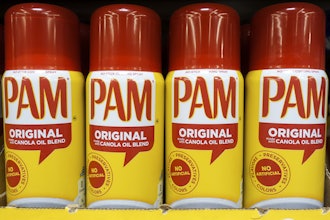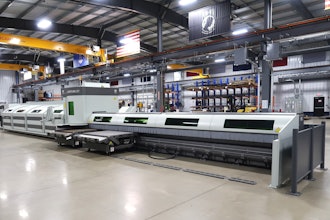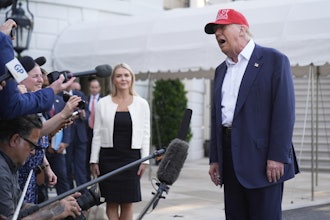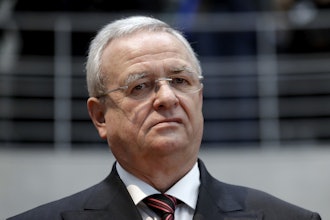REPO-01
Mody, Eamon Javers, Deirdre Bosa, Meg Tirrell, Dina Gusovsky, Josh Lipton>
Markets; Labor; Health and Medicine>
ANNOUNCER: This is NIGHTLY BUSINESS REPORT with Tyler Mathisen and Sue Herera.
TYLER MATHISEN, NIGHTLY BUSINESS REPORT ANCHOR: Full speed ahead -- for now. Stocks rally for a second day in a row as investors and the world await tomorrow`s big decision from the Federal Reserve.
SHARON EPPERSON, NIGHTLY BUSINESS REPORT ANCHOR: Blue chip warning. Shares of 3M (NYSE:MMM) tumble after the manufacturing behemoth lowers its earnings forecast, blaming the slowing global economy.
MATHISEN: A dangerous epidemic -- the new problem that`s plaguing the American workplace.
All that and more tonight on NIGHTLY BUSINESS REPORT for Tuesday, December 15th.
EPPERSON: Good evening, everyone. I`m Sharon Epperson, in tonight for Sue Herera.
MATHISEN: And welcome. I`m Tyler Mathisen.
Stocks rally one day before the Federal Reserve is likely to make an historic decision, an exit its era of zero percent interest rates. The two-day Federal Reserve meeting began today, a day that saw broad-based stock market gains and a rise in oil prices.
That as you might expect helped lift the energy sector. By the close, the Dow Jones industrials were up 156 points to 17,524. The NASDAQ added 43. And the S&P 500 was up 21.
Bob Pisani has more on today`s gains ahead of tomorrow`s big meeting.
(BEGIN VIDEOTAPE)
BOB PISANI, NIGHTLY BUSINESS REPORT CORRESPONDENT: Stocks had a positive day, though, they came off their highs towards the close. Now, a big help was that the two biggest problem sectors, oil and high-yield bonds, both behaved themselves today. It also helps we`re entering a seasonably strong period of the year and that this is the time of the month when tax-selling, selling your losers for the year for tax purposes generally abates.
There`s a problem though -- it`s the Fed. Most traders accept that the Fed really wants to start raising rates. That`s not so much a problem. The issue is, how fast will they raise those rates? Most expect the Fed to say they`ll raise rates very, very slowly. Now, the concern is that the Fed`s chair, Janet Yellen, may inadvertently or not adopt a more hawkish tone, that is she may imply that they`ll raise rates more in 2016 than traders are expecting. That could trigger a wave of concern which means traders might sell stocks quickly. You can see a lot is riding on what the Fed is going to do and on their tone.
For NIGHTLY BUSINESS REPORT, I`m Bob Pisani at the New York Stock Exchange.
(END VIDEOTAPE)
EPPERSON: Our guest tonight says the equity market is set up for what will be a rip-your-face-off rally that will surprise a lot of people. He`s Jeff Saut, chief investment strategist at Raymond James.
And, Jeff, you are saying and your models are saying what a lot of market watchers aren`t saying. Why do you think we`re going to see this rally and over what period of time?
JEFF SAUT, RAYMOND JAMES: Well, first of all, I think the markets were massive live oversold. They were as far below their 50-day moving average -- as oversold as they`ve been in the past three years. And, secondly, you`re into this option expiration that everybody`s worried about. This trillion 1.2 option expiration.
And, historically, December option expirations have been positive for stocks. The VIX or volatility index is in backwardization. I mean, you`re paying more for near term protection than you are for longer downside protection.
And the last reason is, you`ve entered the Santa Claus rally period and I`ve learned hard over the past 45 years, it`s tough to put stocks down in the ebullient month of December.
MATHISEN: Your model pretty much called the August bottom also a turn there in October, as I`m recalling here. So, history is on your side.
But an awful lot of the other commentators aren`t. They see much more modest returns heading into the end of the year and into 2016. How do you counter them?
SAUT: Well, there`s a high/short position in the equity markets. Everybody`s bearish. I mean, there`s a ton of money on the sidelines. Money managers are underperforming. If there is a big rally here, they`re going to have to buy and participate because they have at year end not only performance risk, they have bonus risk and ultimately they have job risk. So, if the market vaults here to the upside -- which is what I think is going to happen -- you`re going to have a lot of people climb onboard, at least on the professional side of the equation.
EPPERSON: So, you`ve been talking about money managers. But what about individual investors, what should they be doing right now with their money?
SAUT: They should be looking in my view at mid stream master limited partnerships. Not the up-streams that have price sensitivity to crude oil and nat gas. But the mid-streams that are basically tool takers with the pipes and the storage. They have decent yields. You get the first time in years to buy some of the big-cap quality mid-stream players.
And I think if you bought those and went into a coma for two years, I think you make a lot of money.
EPPERSON: All right. Good advice there from Jeff Saut with Raymond James -- thank you.
MATHISEN: Well, market experts expect the Central Bank to hike interest rates. As many as three more times next year, this according to the latest CNBC Fed survey of leading economists and market strategist. As a result, most respondents believe that`s bad for stocks, for housing, for the economy and they have raised the probability -- really just the possibility of a recession in 2016.
EPPERSON: Now, when the Federal Reserve makes history by hiking interest rates for the first time in nearly a decade, that`s what everyone is expecting, what might happen to stocks? Not just tomorrow but in the weeks and months ahead?
Dominic Chu takes a look at what investors can expect.
(BEGIN VIDEOTAPE)
DOMINIC CHU, NIGHTLY BUSINESS REPORT CORRESPONDENT: There are some important reasons why the Fed is looking to change its ultra-low interest policy, a policy that`s been in place since the end of 2008, near the depths of the financial crisis.
LISA SHALETT: Our growth in the U.S. economy has been running pretty consistently over the last six years at about 2 percent to 2.5 percent. Yes, that`s below average, but it`s pretty good.
You add in a little bit of inflation, which we have had a little bit, and that tells you that long-term interest rates should theoretically be at about 3 percent and we`ve been at 0 percent.
CHU: While it`s not a sure thing the Fed will do so, investors are preparing for what to do, assuming that a rate hike happens.
Some are looking towards history for close as to how the market will perform in a wake of a Fed interest rate hike. There had been four times since 1990 when the Fed has raised rates after a period of lowering them. And according to market data and analytics firm Kensho, in each of those four times, the overall stock market averaged a negative return one trading month after that rate hike took place. The large-cap S&P 500 was lower by an average of around 2.5 percent and posted a negative return each of those four times.
But that doesn`t have all the experts worried. Some are looking beyond the rate hike and what could be shorter term volatility and they could see longer gains ahead.
STEVE AUTH, FEDERATED: What happened this year is the market`s gotten very narrow. We`ve had decent earnings growth outside of certain sectors and that`s what`s -- the averages in the U.S. So, a lot of strong U.S. companies across many sectors are trading at low double-digit P/Es. We think there could be a pretty healthy multiple expansion, along with some healthy earnings growth in the U.S. next year.
CHU: If the Fed does end up raising interest rates, some sectors could be bigger beneficiaries than others.
SHALETT: We think if we make any changes in 2016, it is probably going to become more defensive, add bonds back to the portfolio, potentially add some bond proxies towards the end of 2016, like utilities, like real estate investment trusts, like consumer staples. We think that there are fundamental changes going on in the consumer backdrop that may really require us to rethink consumer discretionary in 2016.
CHU: One of the big concerns is that we have never had a rate hike after a prolonged period of ultra low interest rates. So, history may be a guide, but many investors are still moving ahead with an abundance of caution.
For NIGHTLY BUSINESS REPORT, I`m Dominic Chu.
(END VIDEOTAPE)
MATHISEN: The Federal Reserve`s decision on rates won`t just be felt here but also outside the U.S. And no place is that more true than in the emerging markets.
Seema Mody explains.
(BEGIN VIDEOTAPE)
SEEMA MODY, NIGHTLY BUSINESS REPORT CORRESPONDENT: The effect of an interest rate rise by the Federal Reserve and the strengthening dollar could spell trouble for the emerging world. Economies that are most vulnerable -- according to TD Securities -- Brazil and Turkey, given that they borrow heavily internationally to finance their economies.
Rising interest rates means the cost to finance these loans will also rise as their currencies appreciate relative to the U.S. dollar. Countries such as India with huge corporate debt exposure to the U.S. dollar will also be adversely affected by a stronger green buck as many companies there have taken loans in dollars. A rate hike would make that debt financing more expensive, which analysts say could spur a credit crisis.
The third group includes countries that have fixed their exchange rates to the dollar, China being the key example. If Fed Chair Janet Yellen indicates rates are on the rise, the dollar could surge which would mean the Chinese central bank, which is already spending a lot of money trying to stimulate its economy would have to invest more to maintain its exchange rate. Hence, why last week, the Central Bank indicated its attention to de-peg the yuan from the dollar and measure its currency against a basket.
Bottom line -- the negative implications of a rate hike on emerging market economies have not gone away.
For NIGHTLY BUSINESS REPORT, I`m Seema Mody.
(END VIDEOTAPE)
EPPERSON: The Federal Reserve has been a popular issue on the campaign trail. Rand Paul has repeatedly said he wants to audit the Central Bank, while Donald Trump has accused Fed Chief Janet Yellen of keeping rates low to help President Obama. Given all the criticism, it`s getting harder for the Fed to keep its non-political reputation intact.
Eamon Javers is in Washington with more on the politicization of the Fed.
And, Eamon, leaving Hillary Clinton aside for a moment -- if any of the other candidates are elected next fall, how would the relationship between the White House and the Fed change in 2017?
EAMON JAVERS, NIGHTLY BUSINESS REPORT CORRESPONDENT: Well, I think it`s got to be different next year if one of these Republicans is elected president in 2016. If you look at, you know, in the past, we`ve seen presidents have tensions and problems with Fed chiefs. There`s no doubt about that.
But what strikes me as new this year is the degree to which we see these candidates out on the campaign trail campaigning against the Fed overtly, and that is a rallying cry for a lot of voters in this country post-2008 who look at the Fed as this sort of mysterious and complicated thing in Washington that`s not really Democratic, it`s maybe controlled by the bankers, it`s kind of confusing and has a lot of power.
All of that makes it sort of an easy poster boy for everything that`s wrong with the relationship between Washington and Wall Street for a lot of voters.
MATHISEN: What sorts of structural changes would some of these candidates like to see visited upon the Fed?
JAVERS: Well, one is that you`ve seen Marco Rubio out there calling for an end to the Fed`s dual mandate. Remember, the Fed has to keep two things in mind as it does its job. It`s worried about inflation, but it`s also worried about job creation.
Marco Rubio has suggested that, you know what, maybe it should really just be worried about inflation and kind of stick to that knitting. That would be a sea change for the Fed. It is a question of whether or not he could get that done if he were elected president.
But you`ve seen other comments from some of the others as well. Donald Trump has said that he`s benefited over his career from the Fed. He`s certainly benefited from low interest rates as a developer. But he says he suspects that Janet Yellen is a political person and that if they begin raising rates, something bad might happen to the U.S. economy.
EPPERSON: All right. Eamon, thank you so much.
JAVERS: You bet.
MATHISEN: And today, we got some new data on the economy, including inflation numbers which Eamon just talked about. It`s important, of course, to the Fed.
Part of that dual mandate as he just mentioned. Consumer prices, unchanged in November as declines in energy and food held down overall costs. The Central Bank would like to see inflation around 2 percent.
EPPERSON: Still ahead: an epidemic that is ravaging communities is now being felt in the American workplace.
(MUSIC)
MATHISEN: In Washington, lawmakers continue to work on a $1.1 trillion bill that would keep the government funded. But there`s one issue that`s holding things up and that is energy policy.
Republicans advocate an end to the oil export ban. Democrats say that if the ban is lifted, it has to be paired with clean energy initiatives.
EPPERSON: A warning from a Dow component. 3M (NYSE:MMM) is cutting its forecast for earnings and sales growth, citing slowing demand across the globe. That pressured shares at 3M (NYSE:MMM), falling 6 percent, making it the performing stock on the blue chip index today.
Deirdre Bosa has more on 3M`s sudden warning.
(BEGIN VIDEOTAPE)
DEIRDRE BOSA, NIGHTLY BUSINESS REPORT CORRESPONDENT: When 3M (NYSE:MMM) worries about global growth, the broader market worries, too. So when the manufacturing giant blamed a sluggish global economy for its second guidance cut in as many months, the sell-off was swift.
DEANE DRAY, RBC CAPITAL MARKETS: It is a surprise. A lot of investors gravitate to 3M (NYSE:MMM) thinking that this is a safety stock. And we`ve always said that 3M (NYSE:MMM) has vulnerability at negative inflection points in the economy just like what we`re seeing here.
BOSA: 3M (NYSE:MMM) is considered a barometer of global economic health, thanks to its huge overseas footprint and diverse business lines, which make everything from Scotch Tape to Post-Its to sandpaper.
The company is now expecting to clear growth of 1 percent. That`s down from its previous guidance of 1.5 percent to 2 percent. And few months ago, it trimmed 1,500 jobs in a global restructuring effort.
3M (NYSE:MMM), though, isn`t sounding all the alarm bells. It expects slow growth to continue in the New Year but not a deep global slump.
DRAY: We`re not seeing anything that would suggest that the economy is -- and for 3M`s businesses -- are deteriorating to the speed at which you would say it`s a recession. It still feels like it is going to it be a low-growth/no-growth type of environment.
BOSA: The strengthening dollar, however, is another issue that may worsen and not just for 3M (NYSE:MMM). If the Fed raises rates tomorrow, the green buck is expected to continue to climb, making products more expensive for consumers than other currencies and hurting international demand for 3M (NYSE:MMM) and other large U.S. companies with overseas sales.
DRAY: FX pressure has been part of the relentless pressure on all these global companies. So, for 3M (NYSE:MMM), 65 percent of their earnings are outside the U.S. FX pressures was a big impact on 2015 and we think this carries into 2016.
BOSA: As several other U.S. industrial companies get set to give their outlooks this week, the market will listen carefully to see if they follow 3M (NYSE:MMM) with more guidance cuts.
For NIGHTLY BUSINESS REPORTS, I`m Deirdre Bosa.
(END VIDEOTAPE)
MATHISEN: Another big stock mover today was Valeant. The embattled drug maker struck a long-term 20-year drug distribution deal with Walgreens. That sent shares up 16 percent while Walgreens Boots Alliance fell just fractionally.
Meg Tirrell has more on the deal and Valeant`s reasons for doing it.
(BEGIN VIDEOTAPE)
MEG TIRRELL, NIGHTLY BUSINESS REPORT CORRESPONDENT: In the agreement announced today, Valeant will offer a 10 percent discount to Walgreens on its dermatology and eye drugs. It will also offer more than 30 branded medicines at generic likes prices, at discounts of 5 percent to 95 percent.
Valeant CEO Mike Pearson today saying that while he estimates these discounts will save the health care system up to $600 million a year, it will drive growth at Valeant.
MICHAEL PEARSON, VALEANT CEO: We are bypassing the typical pharmaceutical distribution system which allows us to save substantial amount of money in terms of system costs. So, rather than selling to middlemen, what we`ll do is directly deliver to Walgreens.
TIRRELL: The deal comes six weeks after Valeant cut ties with the controversial Philidor Specialty Pharmacy after serious allegations about its business practices.
Valeant stock had lost also almost 60 percent in three months leading up to today, after a short seller alleged it was using the specialty pharmacy to commit accounting fraud, and the company faces several federal investigations into its drug pricing practices. Valeant says it believes its accounting for Philidor was appropriate, but it cut ties quickly because of investor reaction.
PEARSON: There`s been no proof that these allegations are true. I was unaware of any of the allegations going on.
TIRRELL: Analysts say the deal with Walgreens is an unexpected vote of confidence. In its 20-year link may signal Valeant`s need for credibility. The agreement extends Walgreens more than 8,000 U.S. retail pharmacies. We`ll hear more tomorrow as Valeant hosts an investor day in Newark.
For NIGHTLY BUSINESS REPORT, I`m Meg Tirrell.
(END VIDEOTAPE)
EPPERSON: A short seller flips his position on Lumber Liquidator. And that`s where we begin tonight`s "Market Focus."
Hedge fund manager Whitney Tilson has said that the flooring retailer would see its stock price go to zero. But now, he`s changed his mind, saying he received information indicating the company`s management wasn`t aware of potential dangerous chemicals in its floorings. The shares were nearly 25 percent higher to $17.53.
Shares of Advance Auto Parts (NYSE:AAP) spiking on an unconfirmed report from "Street Insider." According to the outlet, the company is exploring a sale following an approach from a possible buyer. Shares were almost 6 percent to $156.30.
And Qualcomm (NASDAQ:QCOM) has decided not to split itself up. The chipmaker has been under pressure from an activist investor and has said that it would review the option of separating its chip and licensing business, but concluded that the break-up wouldn`t be beneficial. Shares were up 2.5 percent to $48.02.
MATHISEN: Concerns about iPhone sales continue to pressure shares of Apple (NASDAQ:AAPL). Yesterday, Morgan Stanley (NYSE:MS) cut its iPhone sales estimates and today, a key Apple (NASDAQ:AAPL) supplier preannounced a negative sales warning. Shares of Apple (NASDAQ:AAPL) down nearly 2 percent to $110.49.
Smith & Wesson saw its shares slide following a "New York Times (NYSE:NYT)" report. A New York City public advocate is asking regulators to investigate whether the firm had made adequate disclosures in its financial statements, this according to the newspaper. Shares of Smith & Wesson tumbled almost 10 percent to $21.42.
And Baker Hughes (NYSE:BHI) and Halliburton (NYSE:HAL) have announced that they had extended the time period for closing a proposed merger. The firm said the Justice Department wouldn`t make a decision today on whether to green-light the deal. That was the deadline so they`ll push the deadline back to April. Baker Hughes (NYSE:BHI) fell a fraction to $46.50. Halliburton (NYSE:HAL) was 1.5 percent higher at $37.10.
EPPERSON: There is a new problem gripping America`s workplace: prescription painkillers. Employee abuse of these drugs is a growing problem nationally. And as Dina Gusovsky explains, if the problem isn`t dealt with, it could become very, very costly.
(BEGIN VIDEOTAPE)
SEN. SUSAN COLLINS (R), MAINE: Maine has been particularly hard hit by this epidemic.
SEN. PATTY MURRAY (D), WASHINGTON: Opioid use is a serious problem in my home state of Washington as well.
SEN. LAMAR ALEXANDER (R), TENNESSEE: Tennessee rates near the top of the list for prescription drug abuse.
DINA GUSOVSKY, NIGHTLY BUSINESS REPORT CORRESPONDENT: It`s a problem that`s plaguing this country and now, a new report says prescription painkiller abuse is affecting the workplace in particular. According to a survey released by the National Safety Council and Indiana`s attorney general, 80 percent of Indiana employers have been affected by prescription drug misuse and abuse.
But it`s not just Indiana.
DEBORAH HERSMAN: This is a national problem and it is really important for employers to understand that this is an issue they need to pay attention to and not put their head in the sand.
GUSOVSKY: The president and CEO of the National Safety Council Deborah Hersman says not dealing with this problem will cost businesses big bucks.
UNIDENTIFIED MALE: Injured workers receiving multiple opioid painkiller prescriptions have 4.7 times as many days off.
HERSMAN: If an employee is taking a prescription painkiller, their costs on workers comp go up by four times and 25 percent of all the prescription costs in workers comp are opioid painkillers. Employers need to know what medications their employees are taking, particularly if they`re in safety sensitive jobs. We wouldn`t want our child`s school bus driver, the pilot of our airplane, or the truck driver on the road beside us taking drugs that were impairing.
GUSOVSKY: The most recent figures suggest that prescription opioid abuse costs the United States upwards of $60 billion with almost half of that attributable to workplace costs like loss of productivity. Lawmakers and officials say that a comprehensive approach which includes treatment should be considered for this epidemic that results in about 44 deaths per day.
And while only half of employers have a written policy of using prescription drugs at work, according to the survey, nearly two-thirds think prescription pills like Vicodin and Percocet are more problematic than illegal drugs.
For NIGHTLY BUSINESS REPORT, I`m Dina Gusovsky.
(END VIDEOTAPE)
MATHISEN: Coming up, will new rules for the fast-growing drone industry dampen interest from both consumers and investors.
(MUSIC)
MATHISEN: Here`s what to watch tomorrow. If you`ve been living in a cave, you wouldn`t know the Federal Reserve, it could announce its first rate hikes since 2006, big meeting tomorrow. On the data front, a read on real estate, with the housing starts report a measure of industrial production, and, oh, yes, that Fed meeting, that`s what to watch tomorrow.
New rules for the drone industry starting next week. Owners of consumer drones will have to begin registering them with the government.
As Josh Lipton reports, there`s concern that all those new rules could dampen both consumer and investor enthusiasm.
(BEGIN VIDEOTAPE)
JOSH LIPTON, NIGHTLY BUSINESS REPORT CORRESPONDENT: 2015 was touted as a defining year for drones, with the category positioned for steady growth. Unit (NYSE:UNT) sales were forecast to approach $700,000, a jump of more than 60 percent according to the consumer technology association.
But now that growth is in question. The Federal Aviation Administration announced new rules this week that will require recreational drone users to register their flying machines in a national database. Those who purchase a drone before December 21st must register it by February 19th of next year. And drones bought after December 21st have to be registered before the first flight.
Registration will be free for the first 30 days. After that, the fee is $5.
Lawyers representing the drone industry aren`t pleased with the fee, but don`t expect these new regulations to impact growth.
MICHAEL DROBAC: I`m confident that the technology is just too innovative, too powerful to be held back, both on the commercial and recreational level. The United States has to catch up. And any effort to promote responsibility, any effort to demonstrate that the industry is going to take steps to be a partner and responsible use of the technology, that`s a good thing.
LIPTON: Not everyone is confident. Some venture capitalists in Silicon Valley question whether the drone industry is a smart investment.
VENKY GANESAN: I think you`re going to see a regulatory framework that`s going to be much tighter with drones than with other consumer electronics, and that is absolutely going to have an impact on venture capital financing in this area.
LIPTON: Investors have been fans of drones, committing nearly $430 million to drone start-ups since last year, according to CV Insights.
And now, the question is whether investors and consumers will be as enthusiastic about this technology given these new regulations.
For NIGHTLY BUSINESS REPORT, I`m Josh Lipton in San Francisco.
(END VIDEOTAPE)
EPPERSON: Hollywood showed up in force for the premier of the new "Star Wars" film. Disney (NYSE:DIS) closed down four blocks on Hollywood Boulevard and screened the film in not one, but three theaters last night.
Our cameras caught up with Disney`s CEO Bob Iger who said he never could have predict the amount of interest in the film, not just in the U.S. but worldwide.
(BEGIN VIDEO CLIP)
BOB IGER, DISNEY CEO: When we bought Lucas film, I knew that there was global interest in "Star Wars" movies. There hadn`t been a film out in ten years. It hadn`t really even been released in certain parts of the world.
So, while we had strong instincts about level of interest and what it might do, we had no idea and I will say to you in all honesty standing here tonight, the interest in this film worldwide has exceeded those expectations by a lot.
(END VIDEO CLIP)
EPPERSON: Four more "Star Wars" theme movies are due out by 2020.
MATHISEN: That`s called a franchise.
EPPERSON: That`s right.






















